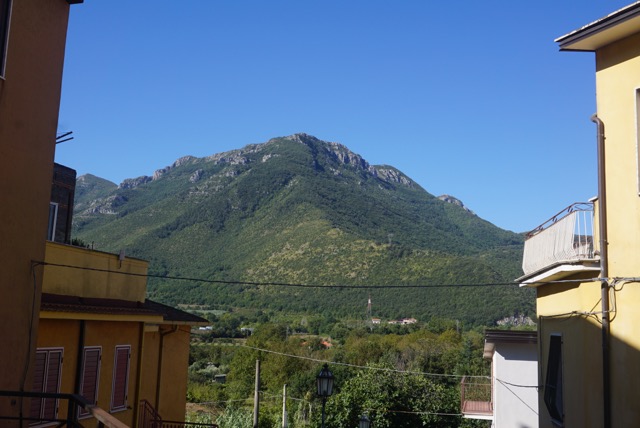First Special Service Force (FSSF) Memorial
Details:
The plaque is located at the top of the left wall in the Comune entryway.
Plaque
The plaque is made of white marble with black inscription and is about 2 feet x 3 feet. The First Special Service Force (FSSF) symbol is in the middle of the plaque. The town of Mignano Montelungo lays in the heart of the Mignano gap- a narrow point along route SS 6 where the Germans built the defensive Bernhardt (also called the Reinhard) line through the surrounding mountains.
The plaque remembers the FSSF first battle in this area, the heroic capture of Monte La Defensa (Also known as Monte La Difensa and Hill 960). The FSSF was a joint Canadian-US unit and was considered the precursor to the modern Special Forces. The FSSF was also known as the “Devil’s Brigade” and a movie entitled the same, starring William Holden, culminates with the Hollywood version of the attack of Monte La Defense.
From US Army History:
“The steep slopes of Monte La Difensa presented a formidable obstacle to the Allied advance. In November 1943, the 7th Infantry Regiment, 3rd Infantry Division tried and failed to seize control of the mountain, despite a valiant ten-day effort. Other 3rd Division units attacked north of La Difensa, but also could not penetrate the stout German defenses. Limited successes along the front were offset by the high casualty rate. November 13, Lt. Gen. Clark called off further offensive operations for the remainder of the month. The FSSF, under the command of Col. Robert T. Frederick, was called on to break the stalemate. His highly-trained force moved into position near the base of Monte La Difiensa under the cover of darkness on the night of December 2. The attack began on the afternoon of the next afternoon with a heavy artillery barrage that saturated the German positions with more than 75,000 rounds. The Force's ground assault commenced under cover of darkness, taking a different route from previous attempts on La Difensa. The Force came in from the east side and moved onto the northern shoulder of the mountain. With artillery pinning down the Germans, the Force began the climb up the steep slope, using ropes to ascend the final 500 feet. Reaching the summit shortly before dawn, the battle commenced when an alerted German sentry fired on the Force members crouching among the rocks. A fierce firefight broke out all along the line. Surprise had been achieved. German defenders, expecting an attack to their front, worked feverishly to reorient their machine guns to meet the assault but were unable to mount an effective defense. They evacuated their positions, escaping down the mountain toward Monte Camino or across the northwest saddle towards Monte Remetana. After two hours of hard, often confused, fighting, the Force secured the top of the mountain. They immediately prepared for a German counterattack. The next three days witnessed constant shelling and counter-attacks, made worse by the rain, snow, and freezing temperatures, which hindered resupply and evacuation of the wounded. The Force sustained heavy casualties from German shelling on the mountaintop. Nevertheless, the Force continued to press the attack, dislodging the Germans from nearby Monte Remetana by December 7. The next night the Force was relieved by the 142nd Infantry Regiment, 36th Division. The first phase of the mountain campaign was ended. The Force had pushed the Germans off Monte La Difensa in a matter of hours when the Fifth Army planners had predicted it would take two or three days. The cost to the Force had been heavy: 73 killed, 313 wounded, and 9 missing in action. A further 116 were evacuated due to weather-related injuries and exhaustion. The assault on Monte La Difensa was the first of many combat operations for the FSSF in Italy."
Monument Text:
The text is written in both English and Italian (side by side). The FSSF symbol is in the center of the plaque.







